|
| NEWS |
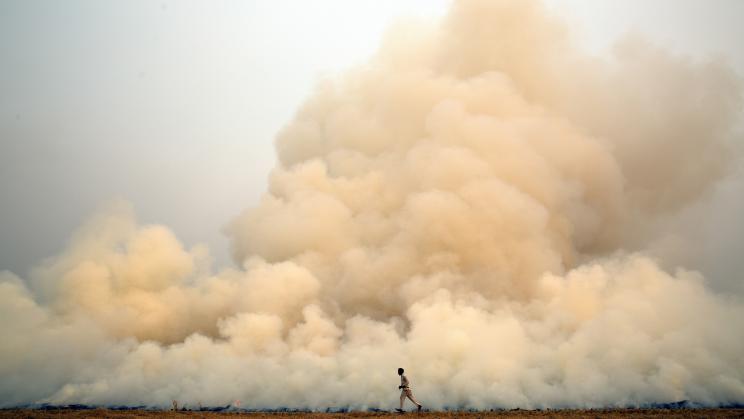 |
| World stumbling into a new era of risk, concludes SIPRI report |
| On 23 May SIPRI released a new major report highlighting that world leaders are failing to prepare for a new era of complex and often unpredictable risks to peace as profound environmental and security crises converge and intensify. The report, Environment of Peace: Security in a New Era of Risk, provides the most comprehensive account to date of how different aspects of the environmental crisis—including climate change, mass extinctions and resource scarcity—are interacting with today’s darkening security horizon and other phenomena such as the fallout of the Covid-19 pandemic. |
|
|
Read more | Read the Environment of Peace report | Visit the Environment of Peace website | Watch the launch event
|
|
|
 |
| New SIPRI data—Multilateral peace operations in 2021: Developments and trends |
|
Ahead of the International Day of United Nations Peacekeepers, SIPRI released new data on multilateral peace operations in 2021. An accompanying topical backgrounder summarized the key findings from the latest data and some of the most important developments in the year. It concluded that it remains to be seen how the war in Ukraine and the aggravation of geopolitical tensions will affect multilateral peace operations. Decision making in the UN Security Council will be more contentious in 2022 than in 2021.
|
|
|
Read more | Read the SIPRI Topical Backgrounder | Access the SIPRI Multilateral Peace Operations Database
|
|
|
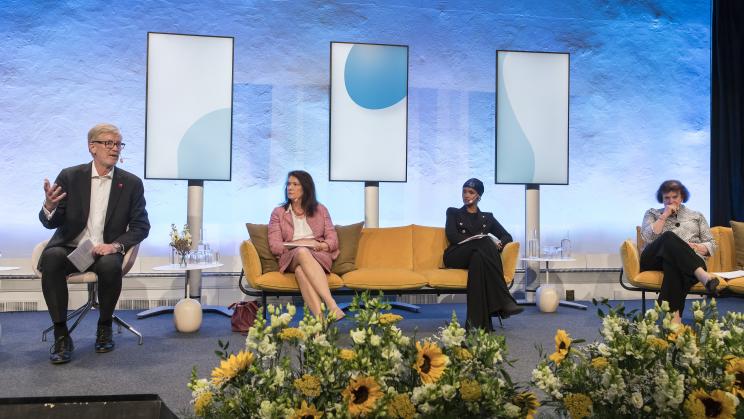 |
| 2022 Stockholm Forum opens, bridging climate and security communities is vital in a new era of existential risk |
|
The ninth annual Stockholm Forum on Peace and Development convened in hybrid format over three days in May, co-hosted by SIPRI and the Swedish Ministry for Foreign Affairs (MFA). The Forum brought more than 2600 participants from 150 countries and over 70 partner organizations together under the theme ‘From a Human Security Crisis Towards an Environment of Peace’. The programme explored the long-term global challenges in the midst of the two crises currently assailing the world—the environmental crisis and the security crisis. Recordings of the plenary sessions are available to watch on SIPRI’s YouTube channel.
|
|
|
Read more | Watch the 2022 Forum playlist on SIPRI’s YouTube channel
|
|
|
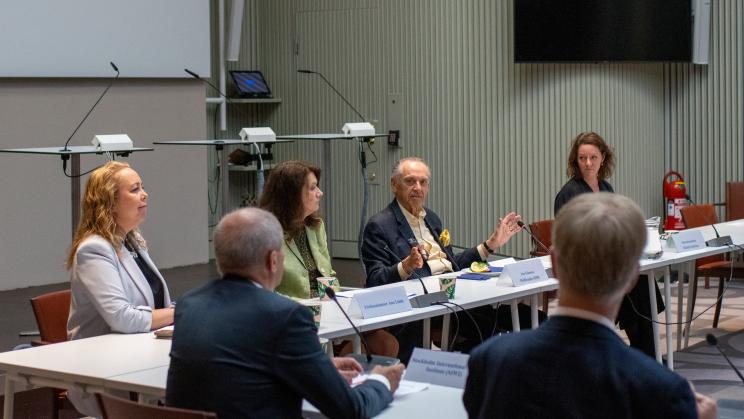 |
| SIPRI joins relaunch of Swedish initiative on environment, climate and security |
|
On 18 May SIPRI joined the relaunch of the Stockholm Hub on Environment, Climate and Security, a cross-institutional research collaboration supported by the Swedish MFA. The Hub explores how social and environmental processes interact with human insecurity, tensions and conflicts. It combines the strengths of four leading Stockholm-based research institutes—SIPRI, the Stockholm Environment Institute (SEI), the Stockholm International Water Institute (SIWI) and the Stockholm Resilience Centre (SRC).
|
|
|
Read more
|
|
|
 |
| New SIPRI film: Environment of Peace panellist Ilwad Elman |
| In this new SIPRI film, Environment of Peace panellist Ilwad Elman, Chief Operating Officer of the Elman Peace Center, highlights how the report Environment of Peace: Security in a New Era of Risk can help to address climate-related security risks in Somalia and be a go-to resource for peacebuilding practitioners, policymakers and the general public to help to ensure a just, peaceful and sustainable future. |
|
|
Watch the SIPRI film
|
|
|
|
| COMMENTARY |
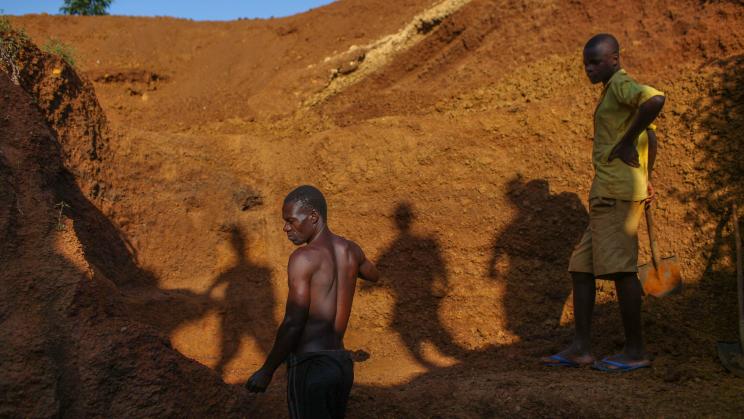 |
| Organized environmental crime: Why it matters for peace operations |
|
Organized environmental crime has become one of the fastest-growing types of organized crime. In many conflict-affected contexts, it is the primary source of financing for non-state armed groups. This topical backgrounder explores how peace operations and other multilateral actors can respond to conflicts that are driven or sustained by activities that involve illegal exploitation and trade in natural resources. It concludes that combating organized environmental crime demands greater holistic and joined-up understanding and approaches to break the vicious circle of illicit environmental exploitation, collective harms, violence and underdevelopment.
|
|
Read the SIPRI Topical Backgrounder
|
|
|
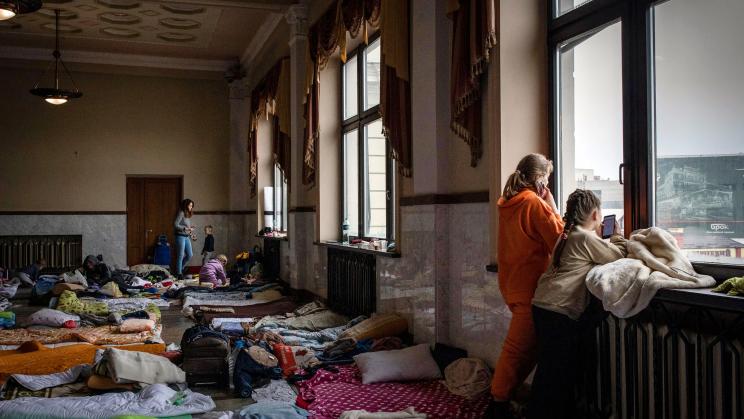 |
| Child development and resilience in war, conflict and displacement |
|
Approximately 452 million children were living in a conflict zone in 2020. Research shows that the development potential of 250 million children under the age of five in low- and middle-income countries is at stake. This topical backgrounder provides an overview of existing aid-supported programmes and current practices to protect and promote children’s psychological development in war and displacement, followed by a review of a selection of rigorous research from the body of relevant literature to suggest ways forward.
|
|
Read the SIPRI Topical Backgrounder
|
|
|
 |
| Libya’s electoral limbo: The crisis of legitimacy |
|
Eleven years after the downfall of Muammar Gaddafi, the situation in Libya remains extremely volatile. Elections planned for 24 December last year did not take place and the electoral process collapsed. As a result, Libya entered yet another period of deep political crisis, at the heart of which is (once again) a struggle over how to create a legitimate, national government. As things currently stand, reconciling differences between the main power brokers remains indispensable and a power-sharing pact between the elites may be the only way forward. Passing through a stage of limited legitimacy is perhaps the only route to popular legitimacy obtained through elections, argues this WritePeace blog.
|
|
Read the SIPRI WritePeace Blog
|
|
|
|
|
 |
| External articles |
|
The following articles by SIPRI experts were recently published:
|
| |
| 2022 Stockholm Forum partner blogs |
|
Ahead of the 2022 Stockholm Forum on Peace and Development, SIPRI published a series of guest blogs by Forum partners linking to their sessions. The blogs cover a range of topics and can be accessed below.
|
|
|
|
| RECENT EVENTS |
| |
| 24 May 2022 |
| The 10th NPT Review Conference: Effective measures for nuclear disarmament |
|
On 24 May SIPRI co-hosted an event with the UN Office for Disarmament Affairs to foster dialogue around the Review Conference for the 1968 Treaty on the Non-Proliferation of Nuclear Weapons (Non-Proliferation Treaty, NPT).
|
|
Read more
|
| |
| 23 May 2022 |
| 2022 SIPRI Lecture |
|
SIPRI was proud to host the fourth annual SIPRI Lecture, held on the theme of ‘Environment of Peace’, at the Stockholm Forum. The 2022 SIPRI Lecture was delivered by HE Helen Clark, former Prime Minister of New Zealand and Administrator of the UN Development Programme.
|
|
Read more | Watch the 2022 SIPRI Lecture
|
| |
| 16–17 May 2022 |
| SIPRI attends EUNPDC seminar on impact of war in Ukraine on international security |
|
On 16–17 May SIPRI actively participated in an ad hoc seminar on ‘War in Ukraine: The Impact on the International Security Architecture—Non-proliferation, Disarmament, Arms Control, Export Controls’. The seminar was held in Brussels in a hybrid format and was organized by the Foundation for Strategic Research (FRS) on behalf of the European Union Non-Proliferation and Disarmament Consortium (EUNPDC).
|
|
Read more
|
|
|
| STAFF NEWS |
One current opening
SIPRI is currently recruiting for one position:
- (Senior) Researcher, Peace and Development Cluster (Closing date: 19 June)
|
|
Read more
|
|
|
| PUBLICATIONS |
 |
| Environment of Peace: Security in a New Era of Risk |
|
The environmental crisis is increasing risks to security and peace worldwide, notably in countries that are already fragile. Without profound changes in approach by institutions of authority, risks will inevitably proliferate quickly. Environment of Peace: Security in a New Era of Risk offers policy principles and recommendations for navigating this new era of risk. A longer report setting out the evidence base in detail will be published later this year.
|
|
Read the policy report
|
|
|
 |
| China’s Evolving Approach to Foreign Aid |
| This paper provides a timely analysis of the evolution of China’s foreign aid policy in the past seven decades with a particular focus on developments since 2000. It discusses China’s development finance to Africa and the major sectors receiving Chinese aid. It also analyses recent trends of Chinese foreign aid and identifies some of the challenges that China faces as it becomes a major player in international development financing. |
|
Read the SIPRI Policy Paper
|
|
|
 |
| The Impact of the Covid-19 Pandemic on Multilateral Peace Operations |
| This SIPRI Report looks at the direct operational impacts the Covid-19 pandemic has had on multilateral peace operations and what these have meant for mandate implementation. The impacts on mandate implementation were largely mission and time specific, and differed per mandate task. Although, at the strategic level, the Covid-19 pandemic may not have significantly changed the short-term global conflict map, its long-term negative impacts may increase the demand for peace operations. |
|
Read the SIPRI Report
|
|
|
 |
| The Human Security Case for Rebalancing Military Expenditure |
|
The concept of human security, as explained in this paper, emphasizes the security of people without neglecting the security of states and state order. The human security approach stresses the necessity to balance the financial needs from all vital risks and threats, regardless of their cause. It logically leads to a reassessment of spending on the military. It also seriously considers the fear that reducing military expenditure will reduce the security of states, a major barrier to past international initiatives to reduce military expenditure.
|
|
Read the SIPRI Report
|
|
|
 |
| EU Military Training Missions: A Synthesis Report |
|
This paper draws overarching conclusions based on a synthesis of previously published case studies that examined the impact of European Union (EU) military training missions (EUTMs) in Somalia (EUTM Somalia, 2010–), Mali (EUTM Mali, 2013–) and the Central African Republic (EUTM RCA, 2016–). It provides recommendations to EU member states and to EUTMs to help to address the main limitations that are restricting the impact of the missions.
|
|
Read the SIPRI Report
|
|
|
 |
| Chronic Crisis Financing? Fifty Years of Humanitarian Aid and Future Prospects |
| This study maps trends of humanitarian funding in the context of total aid at the country level between 1969 and 2019 and estimates how these trends will change in the future. Humanitarian aid was originally intended to respond to short-term emergencies, yet most current humanitarian financing goes to protracted situations, with many countries having received high levels of humanitarian assistance for a decade or longer, which are referred to in this paper as ‘chronic’ crises. The study concludes with open questions to policymakers regarding the use of the humanitarian financing instrument. |
|
Read the SIPRI Insights on Peace and Security
|
|
|
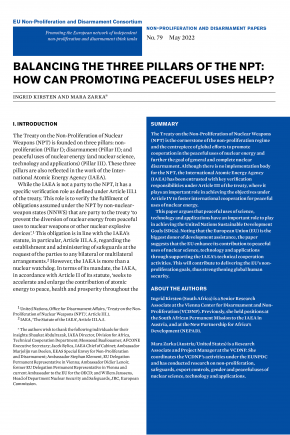 |
| Balancing the Three Pillars of the NPT: How can Promoting Peaceful Uses Help? |
|
This paper argues that peaceful uses of science, technology and applications have an important role to play in achieving the UN Sustainable Development Goals (SDGs). Noting that the EU is the biggest donor of development assistance, the paper suggests that the EU enhance its contribution to peaceful uses of nuclear science, technology and applications through supporting the International Atomic Energy Agency’s technical cooperation activities.
|
|
Read the EU Non-Proliferation and Disarmament Paper
|
|
|
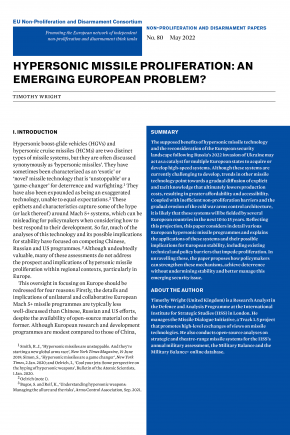 |
| Hypersonic Missile Proliferation: An Emerging European Problem |
|
The supposed benefits of hypersonic missile technology and the reconsideration of the European security landscape following Russia’s 2022 invasion of Ukraine may act as a catalyst for multiple European states to acquire or develop high-speed systems. It is likely that these systems will be fielded by several European countries in the next 10 to 15 years. In the light of this projection, this paper considers in detail various European hypersonic missile programmes and explains the applications of these systems and their possible implications for European stability.
|
|
Read the EU Non-Proliferation and Disarmament Paper
|
|
|
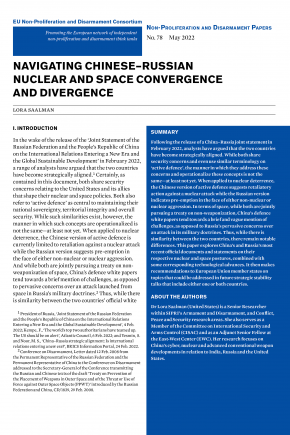 |
| Navigating Chinese–Russian Nuclear and Space Convergence and Divergence |
|
Following the release of a China–Russia joint statement in February 2022 on deepening the coordination between the two countries in areas such as security and development, analysts have argued that the two countries have become strategically aligned. While both share security concerns and even use similar terminology on ‘active defence’, the manner in which they address these concerns and operationalize these concepts is not the same—at least not yet. This paper explores China’s and Russia’s most recent official documents and statements on their respective nuclear and space postures, combined with some corresponding technological advances. It then makes recommendations to EU member states on topics that could be addressed in future strategic stability talks that include either one or both countries.
|
|
Read the EU Non-Proliferation and Disarmament Paper
|
|
|
 |
| SIPRI Yearbook 2021 |
SIPRI Yearbook 2021 presents a combination of original data in areas such as world military expenditure, international arms transfers, arms production, nuclear forces, armed conflicts and multilateral peace operations with state-of-the-art analysis of important aspects of arms control, peace and international security. It covers developments during 2020, including:
- the state of nuclear arms control and the entry into force of the 2017 Treaty on the Prohibition of Nuclear Weapons;
- efforts to regulate lethal autonomous weapon systems, and state behaviour in cyberspace and space;
- regional and country-specific overviews of armed conflicts; and
- the impact of the unfolding Covid-19 pandemic and the UN appeal for a global ceasefire to address it.
|
|
Browse the contents page | Download the summary (PDF) |
Order SIPRI Yearbook 2021 | Download the sample chapter on world nuclear forces (PDF)
|
|
|
| |
|
|
|